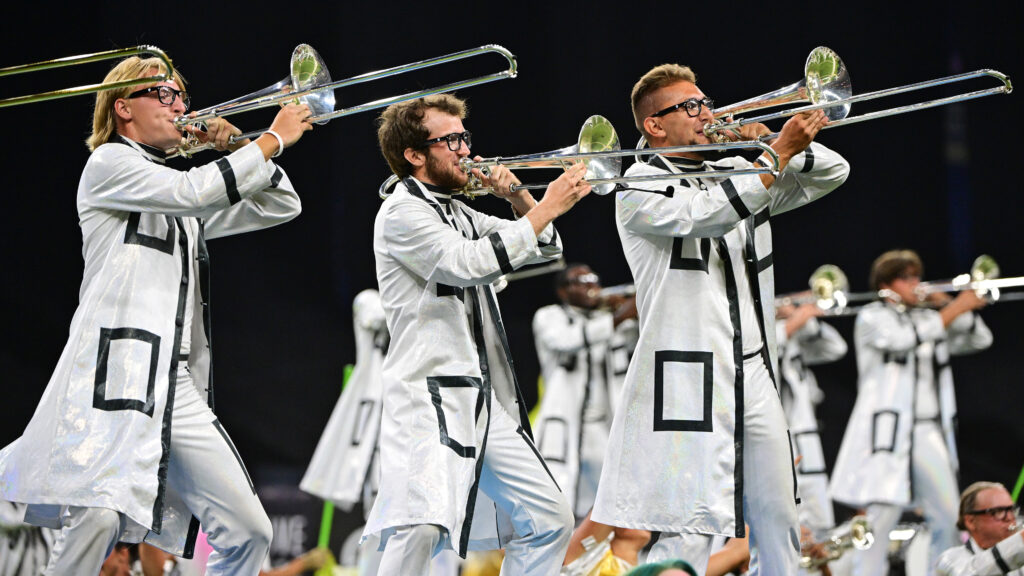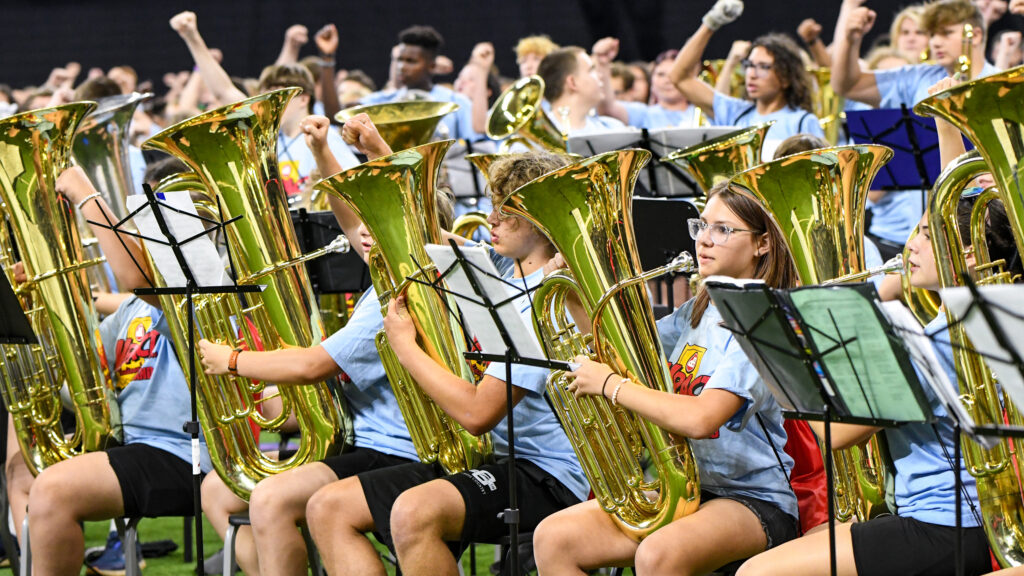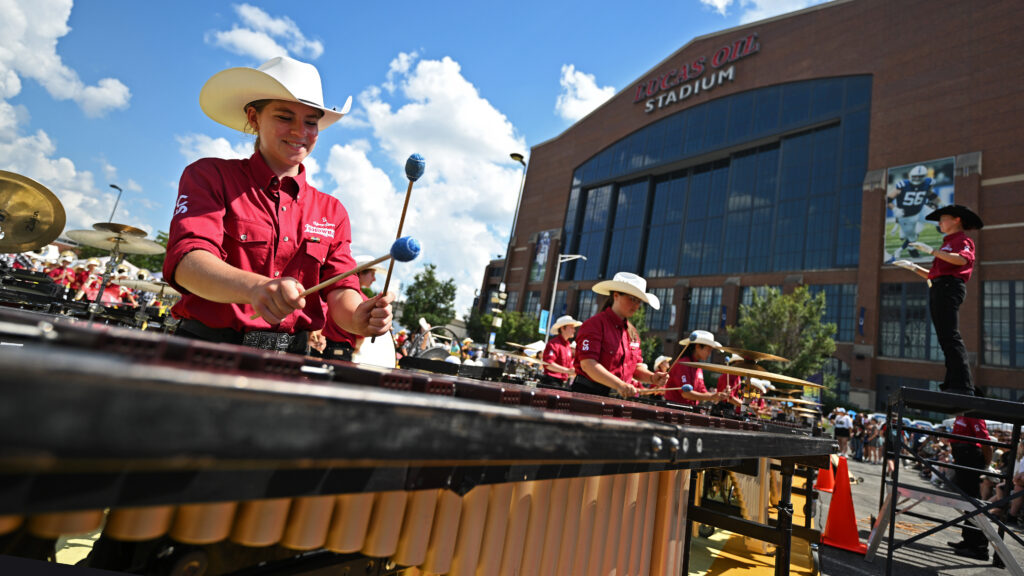DCI’s Tour of Champions, a delightful romp through the Golden State featuring the Madison Scouts, Phantom Regiment, Blue Devils, the Cadets, the Cavaliers and the Santa Clara Vanguard, is captured on a wonderful new DVD.
DCI personality Michael Cesario, who produced the Tour of Champions, graciously took the time to reminisce about the Tour of Champions. The following are his own words. We had this unique opportunity to do so many things. Over the years I’ve been fairly vocal about some of the things we could do, and here was an opportunity to do it with no competitive edge given to anybody. It really struck me as an opportunity for the best corps in the world — all of them have been champion — and put on one heck of a show and really give the focus to the show, as opposed to the focus to the win. The focus would be on the performers, as opposed to the focus being on judging. You know, every night Dan Potter would say, “You know, tonight we bring you drum corps direct — without scores, without judges. And the place would go nuts! And I think that there is an audience for seeing drum corps that way too. Mind you, if they hadn’t been champions there wouldn’t be much of a draw. But I think it’s an alternative way of showing drum corps, not a substitute for what we do but an additional thing. And the idea of being able to help create that, given the guidance of guys like Dave Gibbs, to say “Here is what we think we would like to do, what we think we’re capable of doing. Everybody really pitched in and killed themselves to get this thing done. I think about Pat Seidling, you know, literally managing the tour end of things. I got to produce the ideas and lay them out in front of the directors. So one of the things I knew I wanted to do was get every one of the champions to do a victory concert. So we invented the instant encore. Every corps could come down, they could let their hair down and play some of the tunes that made them famous, or play something that was identified with them, or play something that revealed a certain side of them not necessarily seen in the competitive show. Boy, that worked like a charm. A lot of these corps have theme songs that we don’t necessarily hear. It was a thrill to hear “Somewhere over the Rainbow” and “Send in the Clowns” (was there a dry eye in the house?), and “Ice Castles.” These became part of the show. There was a challenge to that in that some people thought, “Nobody knows that.” There are so many people in that audience that don’t know (the theme songs), don’t know their trademarks. Certainly from the Scouts I knew that there was never a night whenever they played “Ice Castles,” that it didn’t become a magical moment. If you could put these (theme songs) all together and listen to the Blue Devils play, “Chase the Clouds Away,” that it was, for the old fans, nostalgia, and for the new fans, something they’d never heard before. You hear the Phantom Regiment play that brilliant tango show from last year, they come down front and it’s “Elsa’s Procession to the Cathedral,” and oh! They just rocked the house every night. Everybody else stepped in and said, “How are we going to follow this?” We had the indoor concert, which showed off more of the individual and ensemble facets that these corps had, including color guard dancing, and some movement, some singing and some vocal, the were stage band ideas. So we had that with great lighting designers who worked brilliantly. There were all kinds of troubles indoors, and the corps really moved right through it as if they were old pros, which was great. What was wonderful was that I got to work with people that I really couldn’t wait. One of the things I said was, “We will do ensemble numbers,” big festival, en masse things, and you can’t give away the whole shebang coming out of the gate, but you certainly wanted to do the “Star-Spangled Banner.” So I went and begged everybody. JD Shaw is the arranger and principle horn player for the Boston Brass. He did a beautiful thing. I asked for festival trumpets, and he did the most delicate and beautiful arrangement that sent shivers up everyone’s spines every night. It was a great way to start. And how do you even get them out onto the field? (Cavaliers drill designer) Mike Gaines said, “Sure, I’ll do drill for you. I’ll do it as my contribution to drum corps.” Mike Gaines, at the top of his game, as busy as can be, took time to write en masse numbers that included 600-plus performers. You go ahead and figure out how to do that! My old friend Jay Kennedy, magical arranger who arranged for everything from shows to commercials, I asked him, “Jay, can you do for me something original?” I wanted something Olympic in feel, you know, high drama. It had to reveal the power of these corps and he wrote this beautiful “Champion’s Fanfare” and “Simple Gifts,” which I think gives Mr. Copeland a run for his money. More importantly, it displayed this all-brass choir that you just rarely get to hear. When those contras and euphoniums came in, the place erupted. I said, there’s 64 contras. In fact one of the things I asked Mike (Gaines) to do was make sure I could see every contrabass down front. And then he was able to magically orchestrate them so that you could see every one of the units as themselves. Now here comes Frank Dorrittie, who not only arranged “Sing Sing Sing” for us, but did all that terrific recording. There’s only two guys that seem to understand recording drum corps, Larry Rock and Frank Dorrittie. They get the idea of what it’s supposed to sound like, so they know how to pitch the mike and the filters, and that stuff’s just great. Immediately Frank called Dennis (DeLucia) to (arrange percussion for) “Sing Sing Sing.” Here again, the real salute was the performers, who had one day in Utah to get it together. So you saw Jeff Fiedler teaching drill to 600 people. George Hopkins getting on the podium and showing them how to crush down and “mojo” out of the end of “Sing Sing Sing.” These guys were in there, making this happen, and the performers really appreciated the fact that everyone was in there. One of the people I went to to donate their time was Tom Blair, and he produced those lead-in videos that were unbelievable, and that’s what tied the whole show together. When one corps was done, they did their encore then bang, we went to the Jumbotron. And here were these professionally produced things about the history of each of those corps. We could not have done it without Dan Potter. They were tired — it was the week after finals. The next day there we were on the road. So I think even though the competitive season was relatively shorter, the toll had been taken. But the audiences aren’t going to forget it for a long time. People keep asking me if we’re going to do it again, and I keep saying, “Not in my lifetime!” It was a phenomenal amount of work, and the DCI staff was there the whole time too. We went from place to place to place, and adapted to different venues and their ability to provide us everything from sound systems to computer access. Each one of those shows was on the money. The audiences seemed to really respond. It was the performers and, oddly enough, the drum majors who were so responsive and just understood exactly what it took to get their corps to become part of the contribution. I was delighted. I don’t think I had a better time, and I said so right from my hospital bed right afterward.





